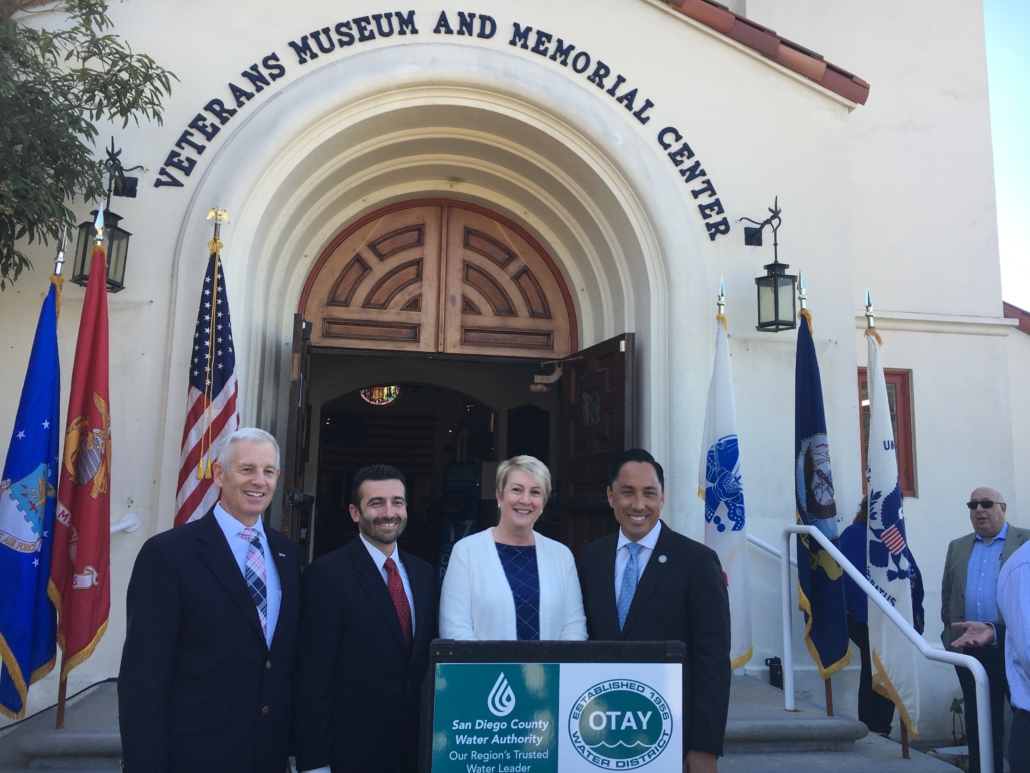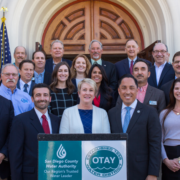State legislation co-sponsored by the San Diego County Water Authority and the Otay Water District has been signed into law, making it possible for veterans to receive credit for their military education and experience when applying for civilian water and wastewater system operator certifications in California.
State legislators, water industry leaders, veteran advocates and business and community organizations gathered at the Veterans Museum in Balboa Park today to celebrate Gov. Gavin Newsom’s signing of Assembly Bill 1588.
The bill was introduced in the state legislature by Assemblymembers Todd Gloria (San Diego) and Adam Gray (Merced), and co-authored by several state legislators, including Assemblymember Tasha Boerner Horvath (Oceanside).
The Water Authority and the Otay Water District co-sponsored the bill to increase the number of military veterans entering the civilian water and wastewater industry at a time when many Baby Boomers are retiring.
‘Silver Tsunami’ of retirements in water industry
“The new law helps our communities two ways – by lowering employment barriers for our veterans and sustaining our vital water and wastewater services for the next generation,” said Water Authority Board Secretary Christy Guerin. “This was a victory for San Diego and the whole state – a successful, bipartisan effort that will help maintain our economy and quality of life.”
The Water Authority and its 24 member agencies have created a regional workforce development task force to address the “Silver Tsunami” of retirees. The task force reported that there are approximately 4,500 water and wastewater positions in the San Diego region – and more than 1,400 of those workers are expected to reach retirement age by 2024. Statewide, there are approximately 6,000 active certified wastewater treatment plant operators and approximately 35,000 drinking water treatment and distribution operators.
Several states help veterans navigate the civilian water system operator certification process and allow veterans to apply equivalency standards to credit military experiences toward state or industry certifications in water and wastewater treatment and distribution. However, no similar approach existed in California.

State legislation introduced by San Diego Assemblymember Todd Gloria (far right) and Merced Assemblymember Adam Gray creates a path to water and wastewater industry jobs for military veterans. AB 1588, signed into law by Gov. Newsom, was co-sponsored by the San Diego County Water Authority and the Otay Water District. (L-to-R in photo: Mark Balmert, Executive Director, SDMAC, Jose Martinez, Assistant Chief Water Operations, Otay Water District, Christy Guerin, Board Secretary, San Diego County Water Authority, and Assemblymember Gloria). Photo: Water Authority
Creating bridges to water industry jobs
“What we are missing, and what this bill addresses, is a pathway in which we honor the experience of our veterans and allow that experience to qualify them for a career path in our civilian water systems,” said Assemblymember Todd Gloria. “Thanks to Governor Newsom, that pathway now exists. California will now properly credit the service of our veterans and enable them to secure good-paying jobs here in our water system. In this time – when the importance of clean water and good paying jobs is undeniable – let’s create bridges not barriers.”
AB 1588 provides a pathway for military veterans to apply their advanced skills and experience toward state and industry-supplied certifications in the water and wastewater treatment and distribution operator fields. Additionally, it ensures that advanced water treatment operators and distribution system operators of potable reuse and recycled water facilities have a career advancement path as certified water and/or wastewater treatment plant operators.
“San Diego County is home to more than 240,000 veterans with skills that benefit our region in numerous ways,” said Assemblymember Tasha Boerner Horvath of Encinitas, a co-author of the bill. “With this legislation, we are building stronger communities that can remain home to servicemembers after they take off the uniform and transition into civilian life.”
Veterans continue public service in water industry
Assistant Chief of Water Operations at the Otay Water District Jose Martinez is a veteran who initiated the idea of the bill and has thrived in the civilian water industry. “As someone who had the pleasure to serve alongside the members of the military responsible for the safe and reliable operation of water and wastewater systems, I observed firsthand their education, experience and dedication,” he said.
“Now, as a water manager responsible for providing safe and reliable water and wastewater services to the public, I championed this bill to provide a path for veterans to receive the certification credit they have earned after years of service. This will ensure that the water sector continues to recruit from the biggest and best talent pools to provide the highest level of service to everyone.”





